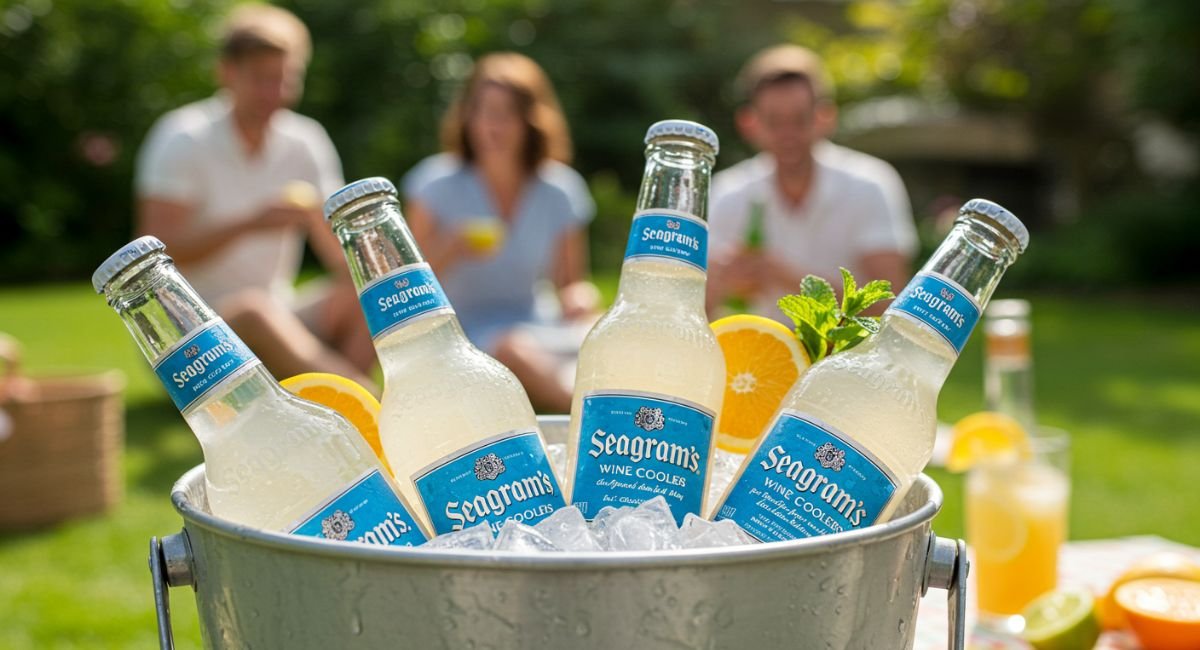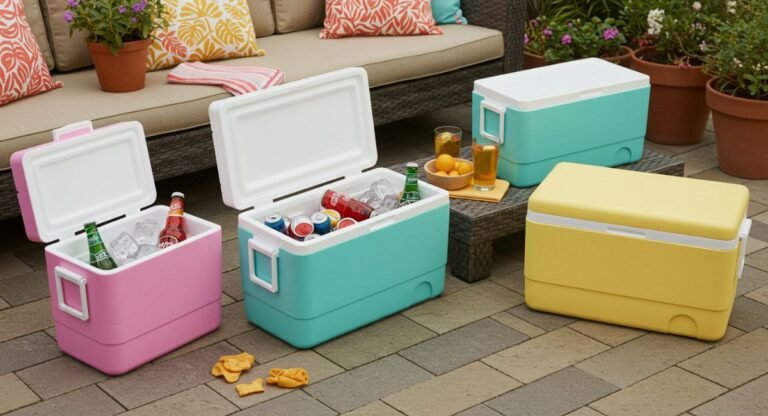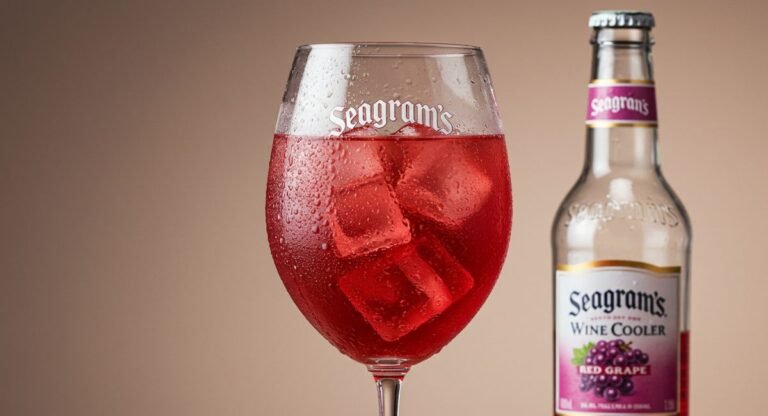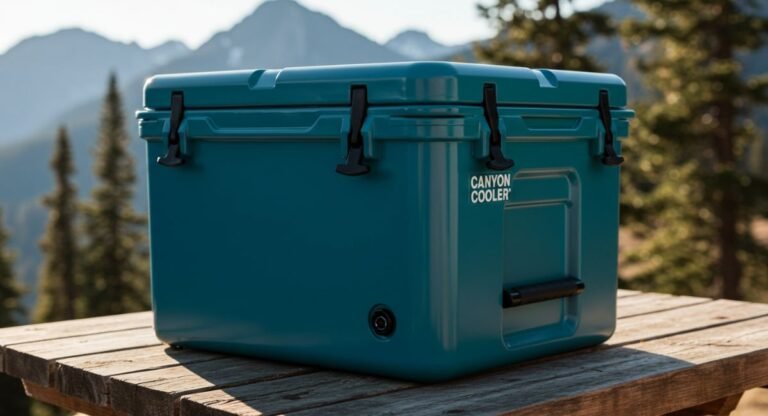Seagrams Wine Coolers Review: My Complete Honest review
Table of Contents
When summer temperatures start climbing, nothing satisfies quite like a cold, fruity beverage in hand. While hard seltzers and craft beers dominate today’s alcohol landscape, there’s a nostalgic favorite making waves once again: Seagrams wine coolers. These sweet, refreshing beverages combine the best elements of wine with fruit flavors for a perfect poolside companion.
Whether you’re an old fan rediscovering these classic drinks or a newcomer curious about what makes Seagrams wine coolers special, this comprehensive guide will walk you through everything from their fascinating history to the best flavors worth trying this season.
The History and Evolution of Seagrams Wine Coolers
From Prohibition to Party Staple
The Seagram’s name has been synonymous with quality beverages for generations. The company’s roots trace back to the 1850s when Joseph E. Seagram began distilling in Waterloo, Ontario. After surviving Prohibition, the Seagram’s brand expanded its offerings beyond whiskey and spirits.
Seagrams wine coolers burst onto the scene in the 1980s when wine coolers were experiencing their first major popularity surge. Their fruity profiles and lower alcohol content made them accessible to a wide range of drinkers looking for something more approachable than straight spirits or wine.
The Original Party Refreshment
During their heyday in the late 1980s and early 1990s, Seagrams wine coolers became a cultural phenomenon. With catchy advertising campaigns featuring Bruce Willis telling viewers to “have fun” and memorable slogans like “The Original Party Refreshment,” these colorful bottles became fixtures at social gatherings across America.
The Modern Seagram’s Escapes
Today’s Seagrams wine coolers have evolved from their original formulation. The current products, marketed as Seagram’s Escapes, are technically malt-based beverages rather than wine-based as they were originally. This change came about in the early 1990s when tax regulations made malt-based coolers more economical to produce.
Despite this change in base alcohol, the spirit of the original Seagrams wine coolers lives on in the brand’s commitment to delivering sweet, fruity refreshment with the same colorful appeal and fun-focused marketing that made them famous.
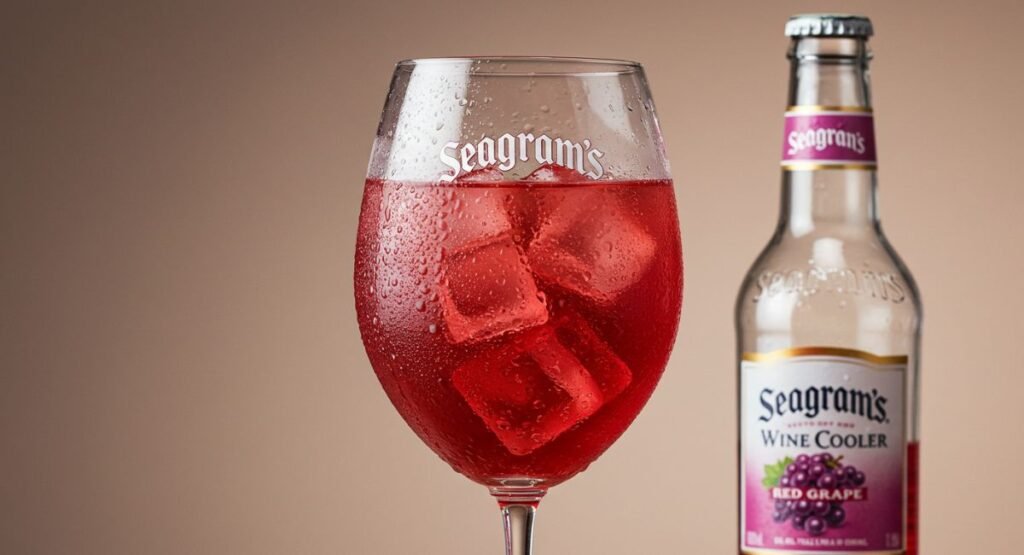
What Exactly Are Seagrams Wine Coolers?
The Ingredients Breakdown
Modern Seagrams wine coolers, now branded as Seagram’s Escapes, contain:
- Malt base (similar to beer, but processed differently)
- Natural and artificial flavors
- Sweeteners
- Carbonation
- Food coloring for their signature vibrant appearance
- Generally 3.2% – 4.5% alcohol by volume (ABV)
This malt base replaces the wine that was used in the original formulation, though many consumers still refer to them as wine coolers due to their historical branding and similar taste profile.
How They Compare to Other Ready-to-Drink Beverages
Understanding where Seagrams wine coolers fit in today’s crowded beverage market:
| Beverage Type | Typical ABV | Base Alcohol | Sweetness Level | Calorie Range |
|---|---|---|---|---|
| Seagram’s Escapes | 3.2-4.5% | Malt | High | 190-250 per bottle |
| Hard Seltzers | 4-6% | Fermented sugar | Low | 90-120 per can |
| Craft Beer | 5-7% | Barley malt | Varies | 150-300 per bottle |
| Wine Spritzers | 6-8% | Wine | Medium | 80-150 per glass |
| Hard Kombucha | 4-7% | Fermented tea | Low-Medium | 100-150 per can |
It occupies a distinct niche for consumers seeking something sweeter and more flavorful than hard seltzers but less intense than spirits-based cocktails.
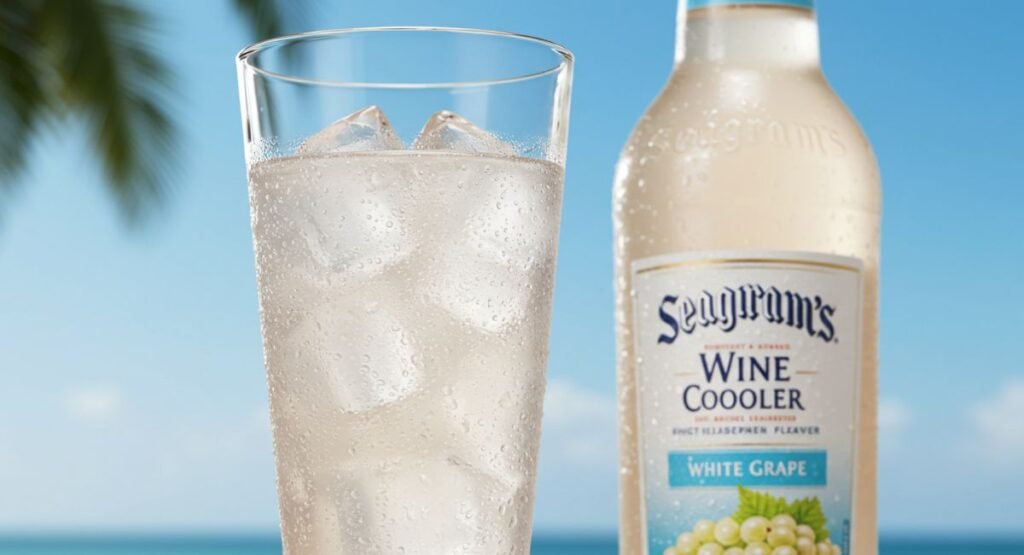
Top Seagram’s Wine Cooler Flavors to Try
Classic Fan Favorites
- Jamaican Me Happy – The brand’s top seller, featuring tropical fruit flavors with notes of pineapple, strawberry, guava, and watermelon.
- Calypso Colada – A piña colada-inspired option with coconut and pineapple flavors that transport you straight to the Caribbean.
- Wild Berries – A medley of raspberry, strawberry, and blueberry flavors that’s consistently rated among the best Seagrams wine coolers.
- Strawberry Daiquiri – Sweet strawberry profile that mimics the classic cocktail without the high alcohol content.
Seasonal and Limited Editions
Seagrams wine coolers frequently release seasonal flavors that capture the essence of different times of year:
- Summer offerings: Watermelon Splash, Peach Bellini
- Fall favorites: Apple Cider, Harvest Sangria
- Winter warmers: Cranberry Twist, Holiday Spice
- Spring selections: Cherry Blossom, Passion Fruit Mango
Best Mixing Options
While delicious on their own, It also make excellent mixers:
- Combine Jamaican Me Happy with coconut rum for a stronger tropical cocktail
- Use Calypso Colada as a base for a frozen blended drink with added rum
- Mix Wild Berries with vodka and fresh fruit for an elevated punch
- Blend Strawberry Daiquiri with frozen strawberries for a slushy treat
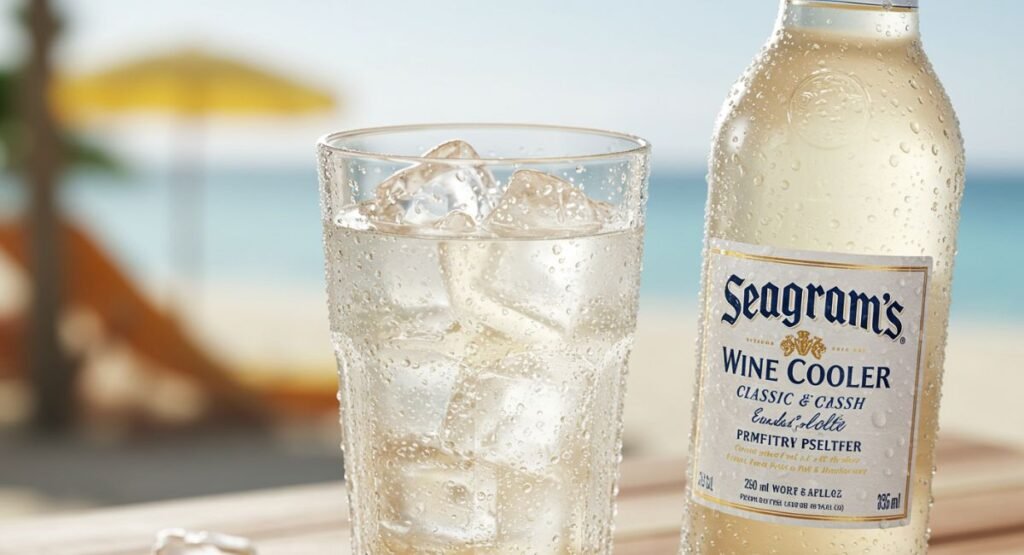
The Comeback of Seagrams Wine Coolers
Nostalgia Factor
The resurgence of Seagrams wine coolers can be partly attributed to nostalgia. Millennials who remember their parents enjoying these colorful drinks are now of legal drinking age and seeking out the flavors of their childhood memories.
Marketing campaigns cleverly tap into this nostalgic appeal while simultaneously positioning the drinks as perfect for today’s social media-oriented consumption habits. The vibrant colors and fruity flavors of Seagrams wine coolers make them highly “Instagrammable” for a generation that eats (and drinks) with their eyes first.
Alignment with Modern Drinking Trends
Several current beverage trends work in favor of Seagrams wine coolers:
- Lower alcohol options – With 3.2-4.5% ABV, they fit the growing preference for session-friendly drinks.
- Ready-to-drink convenience – No mixing required, perfect for outdoor gatherings and on-the-go lifestyles.
- Sweet flavor profiles – While craft beer focused on bitterness for years, younger drinkers often prefer sweeter options.
- Colorful aesthetic – Vibrant beverages that photograph well for social sharing.
As consumers increasingly seek variety in their drinking options, Seagrams wine coolers offer a distinctive alternative to the ubiquitous hard seltzers flooding the market.
How to Enjoy Seagrams Wine Coolers
Serving Suggestions
For the optimal Seagrams wine coolers experience:
- Serve extremely cold (33-38°F) for best flavor
- Pour into a glass with ice for maximum refreshment
- Garnish with fresh fruit that complements the flavor
- Consider a salt or sugar rim for certain varieties
Perfect Pairings
It pair surprisingly well with various foods:
- Light appetizers: Fruit platters, mild cheeses, crackers
- Seafood: Particularly shrimp cocktail and lighter fish dishes
- Spicy foods: The sweetness helps balance heat from Mexican or Thai dishes
- Desserts: Complement fruit-based desserts with matching flavor profiles
Creative Serving Ideas
Take your Seagrams wine coolers to the next level:
- Freeze them partially for a slushy consistency
- Use as a base for party punch by adding fresh fruit and additional spirits
- Create wine cooler ice cubes to add to lemonade or iced tea
- Make adult popsicles by freezing in molds with added fruit pieces
Health and Nutrition Facts About Seagrams Wine Coolers
Calorie and Sugar Content
It’s important to note that Seagrams wine coolers are not low-calorie beverages:
- Most flavors contain between 190-250 calories per 11.2 oz bottle
- Sugar content ranges from 24-32 grams per serving
- Carbohydrates typically fall between 26-34 grams per bottle
For comparison, this makes them considerably higher in calories and sugar than hard seltzers, though comparable to many cocktails and sweeter beers.
Dietary Considerations
Those with dietary restrictions should be aware:
- Seagrams wine coolers are not gluten-free due to their malt base
- They contain artificial colors and flavors that some consumers prefer to avoid
- They are not suitable for strict low-carb diets like keto
- Most flavors are vegan, but consumers with strict requirements should verify specific varieties
Moderation Recommendations
Despite their lower alcohol content,it should still be enjoyed responsibly:
- The sweet flavor can mask alcohol content, making it easy to consume quickly
- The sugar content may contribute to next-day discomfort if consumed in excess
- Alternating with water helps maintain hydration, especially when drinking in hot weather
Where to Buy Seagrams Wine Coolers
Retail Availability
Seagrams wine coolers are widely available at:
- Major grocery chains in their beer/wine sections
- Liquor stores
- Convenience stores
- Some big box retailers like Walmart and Target
Seasonal Variation
Availability of certain flavors may vary by:
- Region (some flavors are more popular in certain parts of the country)
- Season (with special editions available during specific times of year)
- Store type (specialty flavors are more likely at dedicated liquor stores)
Online Options
For hard-to-find flavors or bulk purchasing:
- Direct shipping is available in states where legal
- Delivery services like Drizly, Instacart, and Total Wine offer Seagrams wine coolers
- Some manufacturers’ websites offer store locators to find specific products
DIY Alternatives to Seagrams Wine Coolers
Homemade Wine Cooler Recipes
Can’t find your favorite Seagrams wine coolers? Try these homemade alternatives:
Basic Wine Cooler Formula:
- 4 oz white or rosé wine
- 4 oz fruit juice or soda
- Fresh fruit for garnish
- Ice
Tropical Homemade Cooler:
- 4 oz white wine
- 2 oz pineapple juice
- 2 oz coconut-flavored sparkling water
- Fresh pineapple chunks and maraschino cherry for garnish
Berry Blast Alternative:
- 4 oz rosé wine
- 2 oz mixed berry juice
- 2 oz lemon-lime soda
- Fresh berries for garnish
Lower-Calorie Options
For those watching their caloric intake but still wanting the Seagrams wine coolers experience:
- Use dry wine instead of sweet
- Replace fruit juice with flavored sparkling water
- Add fresh fruit for flavor rather than sweetened syrups
- Use stevia-sweetened mixers instead of sugar-based options
FAQ
Why were Seagrams wine coolers discontinued? The original wine-based Seagram’s coolers were reformulated as malt beverages due to tax regulations, but not discontinued.
How much alcohol is in a Seagram’s wine cooler? Seagram’s Escapes typically contain 3.2%-4.5% alcohol by volume.
What kind of alcohol is Seagram’s Escapes? Seagram’s Escapes are malt-based alcoholic beverages.
What kind of alcohol is malt? Malt alcohol is derived from fermented grains (typically barley) similar to beer production.
Do they sell wine coolers anymore? Yes, wine coolers are still sold, though many (including Seagram’s) now use a malt base instead of wine.
Conclusion: Does it Deserve a Spot in Your Summer Cooler
As summer approaches and beverage options multiply, Seagrams wine coolers offer a unique combination of nostalgia and modern appeal. Their vibrant colors, sweet fruity flavors, and moderate alcohol content make them ideal companions for beach days, backyard barbecues, and casual get-togethers.
While beverage trends come and go, It has demonstrated remarkable staying power by adapting to changing consumer preferences and tax regulations while maintaining their core appeal. The shift from wine base to malt hasn’t diminished their popularity among those seeking flavorful, accessible alcoholic beverages.
Whether you’re rediscovering an old favorite or trying them for the first time, Seagrams wine coolers provide a fun, flavorful alternative to the usual beer and hard seltzer options. Their wide variety of flavors ensures there’s something for everyone’s palate.
This summer, when you’re stocking your cooler for outdoor gatherings, consider making room for a few bottles of these colorful classics. Their convenient ready-to-drink format and approachable flavor profiles might just make Seagrams wine coolers your new seasonal go-to beverage.

